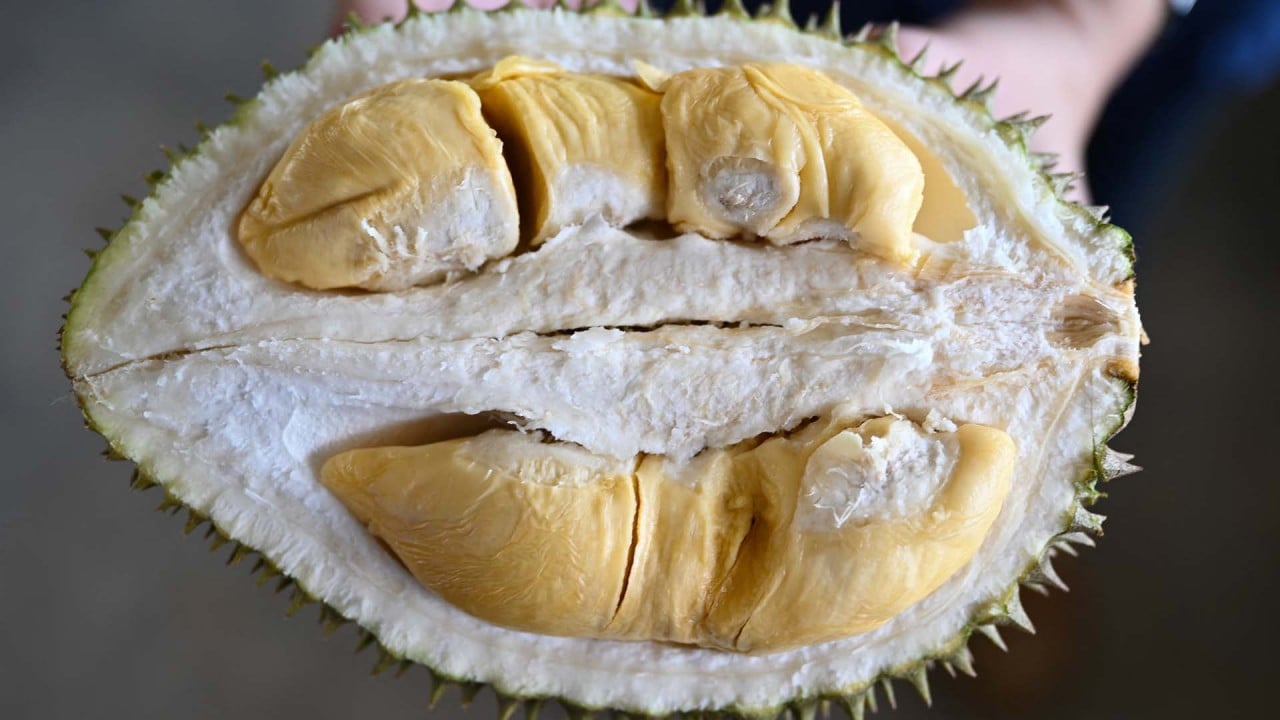How Japan’s Kishida was charmed by durian on trip to Malaysia: ‘it’s good’
It’s the most efficient way to get to know Malaysia, he added.
In a video posted by the ambassador, a smiling Anwar was seen encouraging Kishida to try the durian when both were having refreshments that day.
Kishida gamely sliced off a small portion and displayed it to the camera before popping it into his mouth. His jaw suddenly tightened as he tasted the fruit. Then he broke into a smile.
“It’s good, it’s good,” Kishida said to chuckles and applause from Anwar and the other guests.
Durian fever: China’s Wang Yi raves over Malaysian Musang King cheesecake
Durian fever: China’s Wang Yi raves over Malaysian Musang King cheesecake
The episode may have been a brief, lighthearted moment in a trip packed with discussions on trade, security and territorial claims, but current and former diplomats said that such exchanges can be critical in forging strong relations.
“Anything that generates warmth among leaders and eases discussions, dialogue and engagement, so that things don’t get tense, are very much encouraged,” said former foreign minister Syed Hamid Albar.
“It’s these things that can lead to deep friendships between world leaders,” said Syed Hamid, who was foreign minister from 1999 to 2008.
He has had his fair share of introducing foreign dignitaries to the spiky fruit, whose reputation is far bigger than most Malaysians realise.
“One time, we hosted then South African president Thabo Mbeki in Malaysia and he and his entourage asked to try durian because they heard so much about it.
“So, we had a durian-tasting session,” he added.
Like many who’ve tried durian for the first time, the South African officials loved its creamy, sweet texture but could not get over its smell, said Syed Hamid.
“Back in my day, trying out durian was something we invited all the foreign dignitaries to do, but we wouldn’t serve it to them if they did not ask for it.”
Officials from Asean countries are familiar with the fruit but it may be alien, even daunting, for those from more far-flung places in the world, he added.
“When we offer our unique products, it reflects our culture and it can break the ice so that it becomes easier to talk about more difficult things,” said Syed Hamid.
A foreign ministry official, who is involved in setting up these unique exchanges such as durian-tastings, concurred with Syed Hamid’s assessment, saying that these experiences are how countries project “soft power.”
These cultural products may seem small compared to trade agreements and defence treaties, but they go a long way towards increasing commerce and interpersonal relationships between different countries, said the official.
“When diplomats have serious sessions that are interspersed by little, unique experiences such as durian-tasting – where you have to brave something that smells so alien to taste something out of this world – it produces memorable relationships.”
‘All about the taste’: Japan’s ex-foreign minister on new life as a durian cheerleader
‘All about the taste’: Japan’s ex-foreign minister on new life as a durian cheerleader
Austrian ambassador to Malaysia Andreas Launer attests to how durian can have this effect.
“I believe that the love of durian is the ultimate proof of successful integration of foreigners into Malaysian society and culture. It took a while, but in the meantime, I also think: ‘Durian sangat sedap!’ (durian are delicious),” quipped Launer.
Egyptian ambassador to Malaysia Ragai Nasr said durian tastings are a brilliant and effective diplomatic strategy to showcase a unique Malaysian product.
“Eating this magnificent fruit creates an amicable atmosphere for a diplomatic exchange of ideas between leaders. I am now a fond and regular consumer of the most tasteful and best durian I have eaten in my life.”


